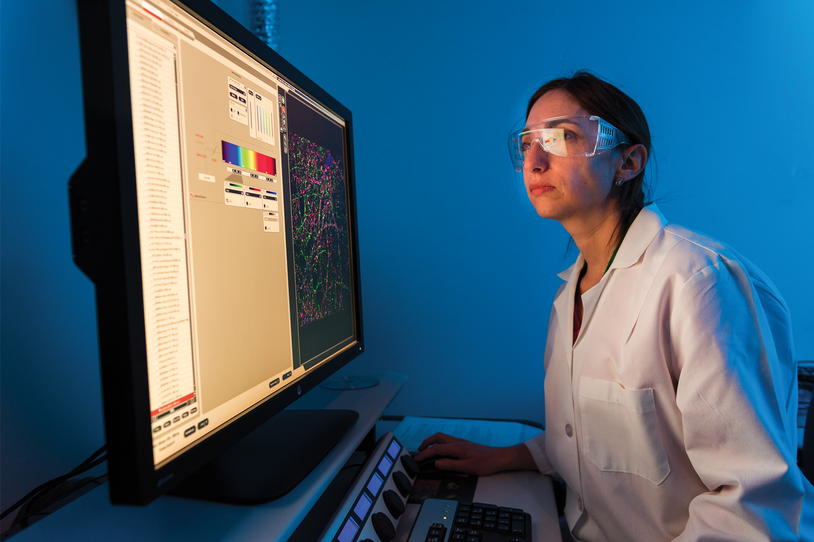
The competition culminated on March 28, 2023, with the announcement that Merck took the competition's top billing, earning an additional $1.5 million funding for developing their tracer. Read more here.
The following story appeared in our Fall/Winter 2020 edition of The Fox Focus on Parkinson’s newsletter. For this story and more, download the full edition.
Imaging tools would transform Parkinson’s care and research. A scan could reveal what is happening inside our brains, allowing doctors to make better diagnoses and scientists to understand if potential therapies are effective.
For more than a decade, The Michael J. Fox Foundation (MJFF) has been leading the field in the development of these critical tools. A major focus of these efforts is the pursuit of an alpha-synuclein tracer. Alpha-synuclein is a protein that can become toxic and form clumps, which are a hallmark of Parkinson’s disease. A PET tracer would allow us to visualize alpha-synuclein clumps in real time.
Jamie Eberling, PhD, vice president, research programs, shares that when she started at MJFF 10 years ago, “very few researchers were working to develop an alpha-synuclein PET tracer.” Today, thanks in large part to MJFF and our partners, researchers around the globe are pursuing it.
Earlier this year, we awarded three teams — from AC Immune, Mass General Brigham, and Merck (known as MSD outside the U.S. and Canada) — a total of $8.5 million through the Ken Griffin Alpha-synuclein Imaging Competition. The program, funded in large part through a leadership gift from Ken Griffin, founder and CEO of Citadel, is spurring a scientific race toward this PET tracer.
And it is a race. There are currently 13 clinical trials of potential Parkinson’s therapies targeting alpha-synuclein. Right now, drug developers have no definitive way to understand if their therapies work as intended.
Does a therapy lower levels of alpha-synuclein in the brain? An alpha-synuclein PET tracer would provide that answer.
Collaborations Spur Progress
The Ken Griffin Alpha-synuclein Imaging Competition is one of several collaborations MJFF has formed to stimulate more tracer development research.
In 2017, we launched a partnership with the Rainwater Charitable Foundation and its Tau Consortium to fund research into tau and alpha-synuclein imaging agents. Tau is another protein that can become toxic in our brains and contribute to disease. A number of diseases, not just Parkinson’s, involve tau and/ or alpha-synuclein. Imaging agents that detect clumps of these proteins could improve care by leading to more accurate and possibly earlier diagnoses. They would also be invaluable for drug development by making it easier to choose the right people for clinical trials and, as noted above, help researchers understand if a therapy is effective. We launched a new funding program with the Rainwater Charitable Foundation this year to continue pressing forward. As Dr. Eberling often says: “the more teams working on this, the better chance we have at success.”
Toxic proteins aren’t the only thing Parkinson’s researchers want to visualize in our brains. DaTscans, which are already approved for use in people with Parkinson’s, measure brain dopamine activity. This can help predict if Parkinson’s symptoms might worsen. Researchers, many using data from MJFF’s landmark clinical study, the Parkinson’s Progression Markers Initiative, are investigating how to use DaTscans to improve clinical trials and better understand Parkinson’s progression.
Today, teams around the world are using a range of approaches to image the brain. MJFF will continue to provide the resources necessary to develop these critical tools as quickly as possible, thanks to the support of our generous partners and donors like you.